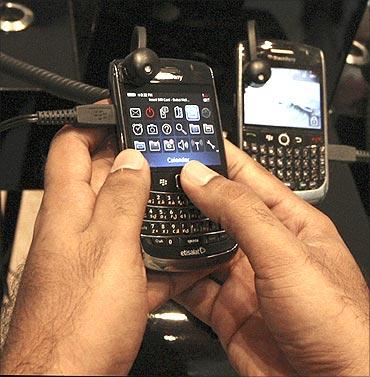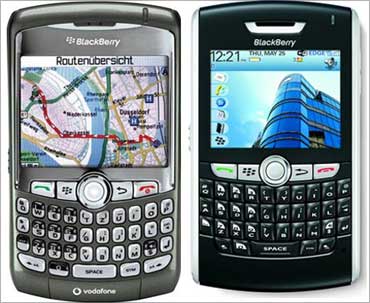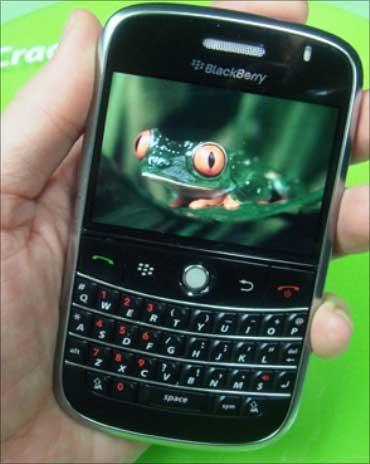
Though millions of BlackBerry users may be worried about the Indian government snooping on them, only the phones of certain terror suspects would be tracked, reports Vicky Nanjappa
For India, terrorism is today a stark and immediate threat that needs to be dealt with. In their attempt to effectively detect this threat and thwart future terror strikes, intelligence agencies often end up treading on certain toes.
A case in point is the battle between telecommunications firm Research in Motion, maker of the popular BlackBerry phone, and Indian agencies.
Since a mail or a message sent out by a BlackBerry is highly encrypted and difficult to decipher, security concerns were raised by Indian authorities, who pointed out that these messages could be used by terrorists to communicate with each other.
Sources in the Intelligence Bureau told rediff.com that within a month, the messages exchanged on the highly popular BlackBerry Messenger will no longer be a private affair. Security agencies are now trying to find a way to access real-time messages and e-mails sent by BlackBerry phones.
Click on NEXT for more...

Certain technical issues still remain, said sources, adding that those will be resolved soon.
Incidentally, Indian agencies had fought for a long time to get permission to access BlackBerry phones, as RIM had dug in its heels and refused to oblige.
Cell phone manufacturer Nokia had already agreed to come under the vigilance radar of Indian agencies. Nokia's push mail services and e-mails exchanged via the phone can be tracked. The telecommunications firm has also allowed Indian agencies to use cell phone tracking technology to pick up the exact location of a person.
Tracking messages or e-mails exchanged on BlackBerry phones through the enterprise server had always been a tricky issue. The investigative agency would first have to access emails and messages stored with the service provider in a decrypted format. The message is then encrypted and sent out to the device and this is done through nearly 4,000-odd servers.
Once these agencies start deciphering BlackBerry messages and e-mails, the activities of terrorists are bound to be hampered; they had preferred this particular device for the very fact that it could not be tracked easily.
Click on NEXT for more...

BlackBerry operates in 175 countries.
For a long time, there was a major stand-off between RIM and the Indian government before the former decided to set up a server in India, which helped local agencies conduct real-time monitoring of BlackBerry services.
Though millions of BlackBerry users may be worried about the Indian government snooping on them, sources assure that only the phones of certain terror suspects would be tracked.
"As per our records, at least one out of every 10 terrorist has been using a BlackBerry. For those worried about their privacy, there is nothing to be worried about as there is no intention of snooping into their BBM without any reason. If one is not guilty, then there is nothing to worry about," said an IB officer.
Before a cell phone can be monitored, agencies have to follow a certain procedure and approach the home ministry.
The ministry then sends out a request to the service provider to access the number. The operator then collects the information through the server and hands it over to the security agency.
Click on NEXT for more...

Currently, eight security agencies have the authority to snoop into BBM services -- Intelligence Bureau, Narcotics Control Bureau, Central Bureau of Investigation, Research and Analysis Wing, Enforcement Directorate, National Technical Research Organisation, the state police wings and the Directorate of Revenue Intelligence.
But these agencies need to put together a proper case before approaching the home ministry. Once a person is placed under the vigilance radar and the necessary formalities fulfilled, these agencies will be able to track the information in real-time with the help of the BlackBerry server and the service providers.
To address the privacy concerns that are bound to come up, legal experts point out that the Supreme Court will have to take a final call in the matter. Currently such monitoring takes place under the aegis of the IT Rules (procedures and safeguards for interception, monitoring and decryption of information) 2009, which allows these agencies to seek permission to track phones in real-time.
But the absolute power enjoyed by the home ministry while granting permission for tapping phones is definitely a cause of concern, as it can be misused very easily. Many corporate firms use BlackBerry services and they may unwittingly reveal vital information if they are being monitored.
But the IB official refutes these issues, stating, "Most arrests have shown us that terrorists prefer the BlackBerry. We wanted to ensure that information is being given to us in real-time, not a day later. We would want to prevent an attack rather than analyse it at a later stage."
Click on NEXT for more...

Click on MORE to see another set of PHOTO features...